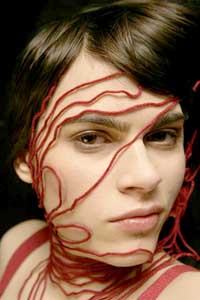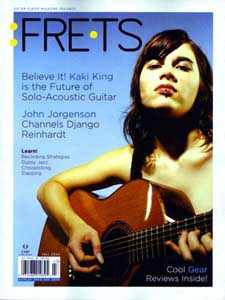-
- Washington sets pace as police expand outreach to gay community
- Pa. minister charged by church for performing same-sex marriage rites
- Colo. worker planning sex-change surgery wins job discrimination case
- Gay GOP candidate wins Minn. primary
- Deaf lesbian charged in South Dakota slaying
- Episcopal bishops unable to reach consensus on gay issues
- National News Briefs
- World News Briefs
Arts & Entertainment
King of the road
Lesbian guitar virtuoso Kaki King takes her acclaimed third album on the road
Published Thursday, 21-Sep-2006 in issue 978
Young lesbian guitar virtuoso Kaki King is back on the road. On tour in support of her acclaimed, recently released third album …Until We Felt Red… (Velour), King is on the roster of the “Yellow Umbrella” tour, which is making numerous stops this fall, including a stop at the Festival Del Mar on Sunday, Sept. 24. Fans of her dazzling artistry will not be disappointed with her fretwork on …Red…, and those who admire King’s extraordinary musical evolution are sure to find something to appreciate in the increased vocals and the addition of looping.
Gay & Lesbian Times: Your song “Kewpie Station” was included on the various artists compilation La Guitarra: Gender Bending Strings that Patty Larkin did. In addition to you and Larkin, there are other out female guitar players on the disc including Sharon Isbin and Mimi Fox. What do you think it is about guitars and lesbians?
Kaki King: I think that anytime that women are breaking into a man’s world, and guitar is certainly an instrument of machismo, it’s typically lesbians that go first.
GLT: Do you play any other instruments?
KK: Yeah, I play drums. Not dykey at all! [Laughs]
GLT: But you don’t see a lot of female drummers.
KK: It’s funny, because Sharon [Isbin] comes from the classical world. And in that world, I think there are more – how should I say this – when people take it up a level, or two or three, and really become masters of their instrument or really work on playing it, I think there are more females in the classical world than in jazz or rock or other areas. One theory that I have about that, tying back into the lesbian thing, is that the women on the La Guitarra [disc] are all playing their guitar at a very advanced level; it involves a lot of practicing, and practicing involves a lot of time spent alone. That is never really something that our society encourages young women to do.
If you’re a guy, a young man, and you’re a total geek and obsessed over car engines or computers, you’re just normal. “Oh, yeah, that’s his thing. He holes up in his attic all day playing with his model trains,” or whatever it is, and that’s fine. If a woman does that, it’s perceived as being very odd. We’re encouraged to be dilettantes, to be very social and have a normal group of friends and this or that. I think it’s discouraged or frowned upon for women to ensconce themselves in something and ignore the rest of the world.
If you’re going to play music at a very high level, that’s something that you’re going to have to do. I think that maybe being different early on, if you’re a lesbian or if you don’t really fit in, it makes that an easier way to enable yourself to do that. It’s a theory. There are obviously lots of very talented straight women out there, but I do find that that seems to be one of the reasons that women don’t typically reach a more advanced level on their instruments than men, because it involves a lot of things that women aren’t encouraged to do.
GLT: As someone who spent time as a subway musician, what advice would you offer to other subway or street musicians?
KK: You learn pretty quickly [laughs]. To anyone who aspires to do that, it’s a really great way to test your musicianship in ways you can’t do in any other setting. I think that’s mainly because technically it’s not a stage and technically they’re not an audience. You don’t have that ultimate pressure and no one’s expecting anything of you. No one’s expecting you to be really good. If they walk past a street performer and they’re really awful, no one’s going to think, “Oh, man, I’m so disappointed.” But at the same time, you are playing music in front of people. It’s kind of a level in between.
The biggest thing that helped me, and still to this day I can draw upon these strengths, is that it’s so distracting. If you’re anywhere that people aren’t expecting you, there are going to be cars or trains or people having conversations, or any number of noises and people absolutely paying no attention. The same can also be said of noisy rock clubs, when you’re the first act of the night and you’re just getting your start.
Really learning to listen to myself and being able to tune everything else out was invaluable. Because when I started opening for people and playing strange random shows where no one knew who I was, there was a lot of the same distractions. Having had that experience really helped me.
That’s something people should focus on, really being inside themselves and hearing themselves over the din of whatever else is happening. No matter who you are, you will encounter some awful show where no one’s paying attention to you except for maybe that one guy in the front row, and you’ve got to play to that guy. Really, you’ve got to play for yourself.
GLT: At your concert during the Montreal Jazz Festival in July when you opened for Ani DiFranco, you overcame the chatty crowd. One of the most striking things about finally getting to see you perform live was watching the way you utilized every inch of the guitars you played. Can you say something about your style of playing?
KK: I’ve been playing guitar since I was really young, 5 years old. It’s like with everything else: You reach a plateau of skill and you look beyond to see, “Where can I go?”
I’m not really interested in the shredder – really fast jazz or rock noodling. I’m not really interested in straight melody. My attention turned more toward the guys that were doing interesting things harmonically. Over time, the boredom of playing the same thing over and over until you’ve got it down, and yet not really wanting to follow the same path that most people follow when you reach a certain level, led me to be an explorer on the guitar.
GLT: There is an interesting progression that has occurred over the course of your three full-length discs. Produced by you, Everybody Loves You was very much a solo effort, featuring you on guitar. Legs to Make Us Longer, produced by David Torn, moves in a different direction and includes a number of other musicians. On …Until We Felt Red…, which was produced John McEntire, you can be heard singing on a few tracks, which adds a whole new dimension. Can you please say something about this evolution?
KK: It’s funny, because for the first time, a few nights ago, I listened to my first record all the way through. It was almost unbelievable. I’d really not listened to it in a few years the whole way through. It led me to two conclusions. One was that this is a work that I should really still be proud of. Like you said, I produced it myself. I had no idea what I was doing and what I was up against. I wasn’t doing it for a label or anything. Those exact songs in that form were the ones that were released. At the same time, I was like, “God, I have really come so far” [laughs], and I hadn’t really appreciated that. You don’t witness that time change day by day.
Then I listened to the new CD all the way through and you’re struck by the difference. I think the one thing – production aside and labels aside, and everything else – the one thing any artist has to aspire to, and it’s what I’ve always tried to aspire to, is that you do something unique and individual; you create your own voice, and through that you can do so many different things and still sound like yourself. Being able to always be creative and always have the thread of sounding yourself, I don’t know if that’s something you discover after three albums, maybe it takes four or five, but that’s something that I felt like I’ve been able to do.
GLT: You are part of the ‘Yellow Umbrella’ tour. What is the significance for you of being part of such an event?
KK: As a young musician and having a band for the first time, touring is very expensive. A lot of people look for sponsorship and sometimes they get them. Sometimes it’s in the form of Budweiser or Jägermeister. Sometimes it’s really unfortunate that you have to go, “Yeah, come join me on the Budweiser bus afterwards.” I’d rather have it be some chick who got cervical cancer and now goes around and talks about. In a funny way – it’s not at all dry or weepy. She was a musician, she got cervical cancer, it was a nightmare, this and that happened, and she’s made it her cause to go around and educate people about gynecological health. I think that’s far more appropriate and fun as a sponsor than Kool cigarettes or some really obvious corporate marketing kind of thing. That said, she’s a sponsor and that’s how the tour has the backing and momentum to get out there and stay on the road for six weeks.
For more information about King, visit her Web site at www.kakiking.com. For more information about the “Yellow Umbrella” tour, visit www.yellowumbrellatour.com.
|
|
Copyright © 2003-2025 Uptown Publications



